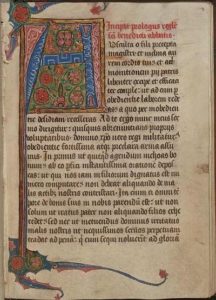 The devil has a motto which is: “Divide and conquer.” Benedictines have a motto that unites us to God: “That in all things God may be glorified.” As a matter of fact, many of the Church’s prayers contain a unifying theme. Jesus teaches us to pray, “Our Father…Give us this day our daily bread”; The Hail Mary states: “Holy Mary, Mother of God, pray for us sinners…”; The Sign of the Cross helps unite us with the Blessed Trinity. Jesus prays, “That they may all be one; even as Thou, Father, art in Me, and I in Thee, that they also may be in Us, so that the world may believe that Thou hast sent Me” (Jn 17:21); St. Michael the Archangel, defend us in battle…be our defense against the wickedness and snares of the devil…”
The devil has a motto which is: “Divide and conquer.” Benedictines have a motto that unites us to God: “That in all things God may be glorified.” As a matter of fact, many of the Church’s prayers contain a unifying theme. Jesus teaches us to pray, “Our Father…Give us this day our daily bread”; The Hail Mary states: “Holy Mary, Mother of God, pray for us sinners…”; The Sign of the Cross helps unite us with the Blessed Trinity. Jesus prays, “That they may all be one; even as Thou, Father, art in Me, and I in Thee, that they also may be in Us, so that the world may believe that Thou hast sent Me” (Jn 17:21); St. Michael the Archangel, defend us in battle…be our defense against the wickedness and snares of the devil…”
St. Benedict is keenly aware that “grumbling” (which is gossip or discontent) can “divide and conquer” any group. That is why he is very strict in teaching against it. “Do not grumble or speak ill of others” (RB 4:39-40).
“This very obedience, however, will be acceptable to God and agreeable to men only if compliance with what is commanded is not cringing or sluggish or halfhearted, but free from any grumbling or any reaction of unwillingness (RB 5:14); “First and foremost, there must be no word or sign of the evil of grumbling, no manifestation of it for any reason at all. If, however, anyone is caught grumbling, let him undergo more severe discipline” (RB 34:6, 7).
Even the abbot is advised: “Similarly, he should so regulate and arrange all matters that souls may be saved and the brothers may go about their activities without justifiable grumbling” (RB 41:5).
Jesus ardently desired that His followers are to be united in faith and at peace with all those whom one would come in contact with and live a life of solidarity with Himself and our Father.
Christ’s Priestly Prayer for Unity, John: 17, is saturated with fervent desires for human and divine solidarity. Here is one example.
“That all may be one even as We are One: I in them and Thou in Me: that they may be perfected in unity, and that the world may know that Thou hast sent me (Jn 17: 22-23)”
Jesus taught His apostles and disciples to be ardent in their faith and gave them numerous examples of being heralds of being faithful regardless of the circumstances they were in. After experiencing all that He went through in holy obedience to our Father in bravely facing persecution, denial and the cruelest of deaths ever devised, Christ showed us by example what true loyalty involves.
 St. Benedict echoes this sentiment when he writes to us about what Christian solidarity entails, and the rewards that follow. “Never swerving from his instructions, then, but faithfully observing his teaching in the monastery until death, we shall through patience share in the sufferings of Christ that we may deserve also to share in his kingdom” (RB Prol 50).
St. Benedict echoes this sentiment when he writes to us about what Christian solidarity entails, and the rewards that follow. “Never swerving from his instructions, then, but faithfully observing his teaching in the monastery until death, we shall through patience share in the sufferings of Christ that we may deserve also to share in his kingdom” (RB Prol 50).
Psalm 15 with the Title, “The Guest of God,” gives us a good summary of human solidarity.
O Lord, who will sojourn in your tent? Who shall dwell on your holy mountain?
He who walks blamelessly and who does justice. He who thinks the truth in his heart, and slanders not with his tongue; who harms not his fellow man, nor takes up a reproach against his neighbor; by whom the reprobate is despised, while he honors those who fear the Lord; who though it be to his loss, changes not his pledged word; who lends not at usury and accepts no bribe against the innocent.
He who does these things shall never be disturbed.
 Br. Daniel Sokol, OSB, is a member of Prince of Peace Abbey in Oceanside, California.
Br. Daniel Sokol, OSB, is a member of Prince of Peace Abbey in Oceanside, California.




